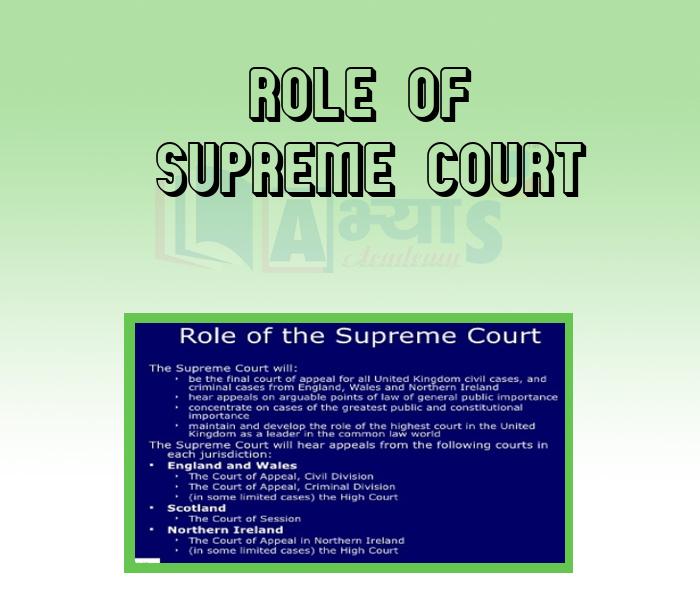Role of Supreme Court

Role of Supreme Court
The Supreme Court: The Supreme Court is the highest court in India with the chief justice as its head. The chief justice of the Supreme Court is also the chief justice of India. The chief justice is appointed by the president of India. The other judges are appointed, on the recommendation of the Chief Justice, by the president. So the legislature or executive cannot interfere in the working of the judiciary.
Required Qualification: To become a judge of the Supreme Court, besides being an Indian citizen, a person must be an advocate at a High Court with a minimum of ten years experience, or a High Court judge with at least five years experience, or a distinguished jurist i.e., expert in law.
Term of Office: The retirement age of the Supreme Court is 65 years.
Functions and powers of the Supreme Court: The high court of India has to perform specific functions within the jurisdiction as provided by the constitution. The functions can be elaborated under the following heads:
1. Original jurisdiction: Under original jurisdiction, the Supreme Court deals with those cases which come directly under its jurisdiction. These cases may relate to
2. Appellate jurisdictions: The Supreme Court is the apex court for jurisdiction in India. When someone is not satisfied with the decision given by the high court of a state, he/she may ask the Supreme Court to review the judgment. The Supreme Court may reconsider the case. This is called appellate jurisdiction of the Supreme Court.
3. Writ Jurisdiction: The Supreme Court is the guardian of our fundamental rights. When someone feels that their fundamental rights are violated or they are deprived of their fundamental rights, they can directly file a petition in the Supreme Court then gives special orders in the form for a writ to get the fundamental rights implemented.
4. Advisory Jurisdiction: In addition to the above discussed functions of the Supreme Court, sometimes it has to perform advisory functions also. Sometimes the president of India can refer any matter of public importance to the court for its advice. However, the President is not bound to accept the advice /suggestions made by the Supreme Court.
5. Judicial Review: Any law or policy made by the government that is not in accordance with the text or intention of the constitution can be declared as illegal. This is known as judicial review.
6. Court of Records: All the causes brought before the Supreme Court and where judgments have been given is maintained as record by the Supreme Court.
7. Contempt of court: The Supreme Court has the power to punish anyone for contempt of any law court in India, including itself. Contempt of court refers to any behaviour that opposes or defies the authority or dignity of the court.
Public Interest Litigation (PIL):- Any citizen of India can go to the court if the interest of the public has been affected by the deeds of government. The courts check the malpractices of public officials and prevent the misuse of power by the government.
Students / Parents Reviews [10]
One of the best institutes to develope a child interest in studies.Provides SST and English knowledge also unlike other institutes. Teachers are co operative and friendly online tests andPPT develope practical knowledge also.

Aman Kumar Shrivastava
10thMy experience with Abhyas is very good. I have learnt many things here like vedic maths and reasoning also. Teachers here first take our doubts and then there are assignments to verify our weak points.

Shivam Rana
7thIt was good as the experience because as we had come here we had been improved in a such envirnment created here.Extra is taught which is beneficial for future.

Eshan Arora
8thIt has a great methodology. Students here can get analysis to their test quickly.We can learn easily through PPTs and the testing methods are good. We know that where we have to practice

Barkha Arora
10thAbhyas Methodology is very good. It is based on according to student and each child manages accordingly to its properly. Methodology has improved the abilities of students to shine them in future.

Manish Kumar
10thBeing a parent, I saw my daughter improvement in her studies by seeing a good result in all day to day compititive exam TMO, NSO, IEO etc and as well as studies. I have got a fruitful result from my daughter.

Prisha Gupta
8thMy experience was very good with Abhyas academy. I am studying here from 6th class and I am satisfied by its results in my life. I improved a lot here ahead of school syllabus.

Ayan Ghosh
8thIt was a good experience with Abhyas Academy. I even faced problems in starting but slowly and steadily overcomed. Especially reasoning classes helped me a lot.

Cheshta
10thAbout Abhyas metholodology the teachers are very nice and hardworking toward students.The Centre Head Mrs Anu Sethi is also a brilliant teacher.Abhyas has taught me how to overcome problems and has always taken my doubts and suppoeted me.

Shreya Shrivastava
8thI have spent a wonderful time in Abhyas academy. It has made my reasoning more apt, English more stronger and Maths an interesting subject for me. It has given me a habbit of self studying








